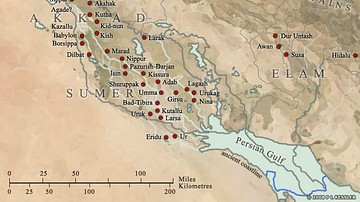Saint Augustine of Hippo (354-430 CE) most famous for his work Confessions and his City of God, is regarded as one of the Fathers of The Church in the tradition of Catholicism. In this brief essay from his The Literal Meaning of Genesis, Augustine denounces Christians who speak on subjects they know little or nothing about in an attempt to appear `wise' among non-Christians. In this work, Augustine echoes and expands upon the sentiment of the biblical author of the Christian New Testament Book of James who wrote, “If any man among you seem to be religious and bridleth not his tongue, but deceiveth his own heart, this man's religion is vain” (James 1:26) and “Even so the tongue is a little member, and boasteth great things. Behold how great a matter a little fire kindleth”(James 3:5). The piece is interesting on many levels but, certainly, for an understanding of how early Christians viewed non-Christians and how they were instructed to comport themselves among those outside of the Christian faith.
“Usually, even a non-Christian knows something about the earth, the heavens, and the other elements of this world, about the motion and orbit of the stars and even their size and relative positions, about the predictable eclipses of the sun and moon, the cycles of the years and the seasons, about the kinds of animals, shrubs, stones, and so forth, and this knowledge he holds to as being certain from reason and experience.
Now, it is a disgraceful and dangerous thing for an infidel to hear a Christian, presumably giving the meaning of Holy Scripture, talking nonsense on these topics; and we should take all means to prevent such an embarrassing situation, in which people show up vast ignorance in a Christian and laugh it to scorn. The shame is not so much that an ignorant individual is derided, but that people outside the household of faith think our sacred writers held such opinions, and, to the great loss of those for whose salvation we toil, the writers of our Scripture are criticized and rejected as unlearned men.
If they find a Christian mistaken in a field which they themselves know well and hear him maintaining his foolish opinions about our books, how are they going to believe those books in matters concerning the resurrection of the dead, the hope of eternal life, and the kingdom of heaven, when they think their pages are full of falsehoods and on facts which they themselves have learnt from experience and the light of reason? Reckless and incompetent expounders of Holy Scripture bring untold trouble and sorrow on their wiser brethren when they are caught in one of their mischievous false opinions and are taken to task by those who are not bound by the authority of our sacred books. For then, to defend their utterly foolish and obviously untrue statements, they will try to call upon Holy Scripture for proof and even recite from memory many passages which they think support their position, although they understand neither what they say nor the things about which they make assertion."






